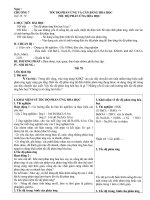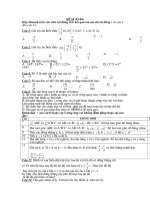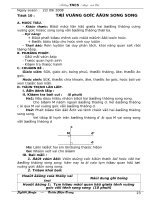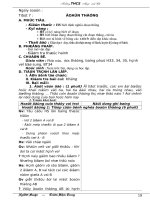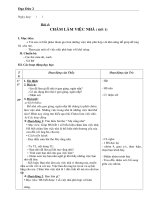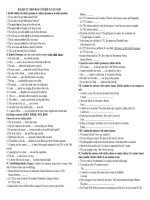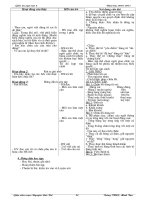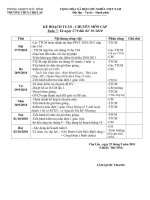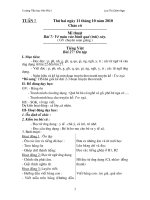Food Technology Years 7–10 Syllabus pot
Bạn đang xem bản rút gọn của tài liệu. Xem và tải ngay bản đầy đủ của tài liệu tại đây (781.14 KB, 57 trang )
Food Technology
Years 7–10
Syllabus
June 2003
© 2003 Copyright Board of Studies NSW for and on behalf of the Crown in right of the State of New South Wales.
This document contains Material prepared by the Board of Studies NSW for and on behalf of the State of New South Wales.
The Material is protected by Crown copyright.
All rights reserved. No part of the Material may be reproduced in Australia or in any other country by any process, electronic
or otherwise, in any material form or transmitted to any other person or stored electronically in any form without the prior
written permission of the Board of Studies NSW, except as permitted by the Copyright Act 1968. School students in NSW
and teachers in schools in NSW may copy reasonable portions of the Material for the purposes of bona fide research or study.
When you access the Material you agree:
• to use the Material for information purposes only
• to reproduce a single copy for personal bona fide study use only and not to reproduce any major extract or the entire
Material without the prior permission of the Board of Studies NSW
• to acknowledge that the Material is provided by the Board of Studies NSW
• not to make any charge for providing the Material or any part of the Material to another person or in any way make
commercial use of the Material without the prior written consent of the Board of Studies NSW and payment of the
appropriate copyright fee
• to include this copyright notice in any copy made
• not to modify the Material or any part of the Material without the express prior written permission of the Board of Studies
NSW.
The Material may contain third party copyright materials such as photos, diagrams, quotations, cartoons and artworks. These
materials are protected by Australian and international copyright laws and may not be reproduced or transmitted in any
format without the copyright owner’s specific permission. Unauthorised reproduction, transmission or commercial use of
such copyright materials may result in prosecution.
The Board of Studies has made all reasonable attempts to locate owners of third party copyright material and invites anyone
from whom permission has not been sought to contact the Copyright Officer, ph (02) 9367 8289, fax (02) 9279 1482.
Published by
Board of Studies NSW
GPO Box 5300
Sydney NSW 2001
Australia
Tel: (02) 9367 8111
Fax: (02) 9367 8484
Internet:
June 2003
ISBN 1 7409 9279 2
2003299
20120482
20121660
1 Introduction 5
1.1 The K–10 Curriculum 5
1.2 Students with Special Education Needs 6
2 Rationale 8
3
The Place of the Food Technology Years 7–10 Syllabus in the
Technology K–12 Curriculum 9
4
Aim
10
5
Objectives 11
6
Outcomes 12
7
Content 14
7.1
Organisation of Content 14
7.2
Content for Years 7–10 18
8
Life Skills Outcomes and Content 38
8.1
Outcomes 38
8.2
Content 39
9
Continuum of Learning in Food Technology K–10 45
9.1
Stage Statements 45
10
Assessment 51
10.1
Standards 51
10.2
Assessment for Learning 51
10.3
Reporting 53
10.4
Choosing Assessment Strategies 54
Contents
Food Technology Years 7–10 Syllabus
1 Introduction
1.1 The K–10 Curriculum
This syllabus has been developed within the parameters set by the Board of Studies NSW in
its K–10 Curriculum Framework. This framework ensures that K–10 syllabuses and
curriculum requirements are designed to provide educational opportunities that:
• engage and challenge all students to maximise their individual talents and capabilities for
lifelong learning
• enable all students to develop positive self-concepts and their capacity to establish and
maintain safe, healthy and rewarding lives
• prepare all students for effective and responsible participation in their society, taking
account of moral, ethical and spiritual considerations
• encourage and enable all students to enjoy learning, and to be self-motivated, reflective,
competent learners who will be able to take part in further study, work or training
• promote a fair and just society that values diversity
• promote continuity and coherence of learning, and facilitate the transition between
primary and secondary schooling.
The framework also provides a set of broad learning outcomes that summarise the knowledge,
understanding, skills, values and attitudes essential for all students to succeed in and beyond
their schooling. These broad learning outcomes indicate that students will:
• understand, develop and communicate ideas and information
• access, analyse, evaluate and use information from a variety of sources
• work collaboratively with others to achieve individual and collective goals
• possess the knowledge and skills necessary to maintain a safe and healthy lifestyle
• understand and appreciate the physical, biological and technological world and make
responsible and informed decisions in relation to their world
• understand and appreciate social, cultural, geographical and historical contexts, and
participate as active and informed citizens
• express themselves through creative activity and engage with the artistic, cultural and
intellectual work of others
• understand and apply a variety of analytical and creative techniques to solve problems
• understand, interpret and apply concepts related to numerical and spatial patterns,
structures and relationships
• be productive, creative and confident in the use of technology and understand the impact
of technology on society
• understand the work environment and be equipped with the knowledge, understanding and
skills to evaluate potential career options and pathways
• develop a system of personal values based on their understanding of moral, ethical and
spiritual matters.
The ways in which learning in the Food Technology Years 7–10 Syllabus contributes to the
curriculum and to the student’s achievement of the broad learning outcomes are outlined in
the syllabus rationale.
In accordance with the K–10 Curriculum Framework, the Food Technology Years 7–10
Syllabus takes into account the diverse needs of all students. It identifies essential knowledge,
understanding, skills, values and attitudes. It enunciates clear standards of what students are
expected to know and be able to do in Years 7–10. It provides structures and processes by
5
Food Technology Years 7–10 Syllabus
which teachers can provide continuity of study for all students, particularly to ensure
successful transition through Years 5 to 8 and from Year 10 to Year 11.
The syllabus also assists students to maximise their achievement in Food Technology through
the acquisition of additional knowledge, understanding, skills, values and attitudes. It contains
advice to assist teachers to program learning for those students who have gone beyond
achieving the outcomes through their study of the essential content.
1.2 Students with Special Education Needs
In the K–6 curriculum, students with special education needs are provided for in the following
ways:
• through the inclusion of outcomes and content in syllabuses which provide for the full
range of students
• through the development of additional advice and programming support for teachers to
assist students to access the outcomes of the syllabus
• through the development of specific support documents for students with special
education needs
• through teachers and parents planning together to ensure that syllabus outcomes and
content reflect the learning needs and priorities of students.
Students with special education needs build on their achievements in K–6 as they progress
through their secondary study and undertake courses to meet the requirements for the School
Certificate.
It is necessary to continue focusing on the needs, interests and abilities of each student when
planning a program for secondary schooling. The program will comprise the most appropriate
combination of courses, outcomes and content available.
Life Skills
For most students with special education needs, the outcomes and content in sections 6 and 7
of this syllabus will be appropriate but for a small percentage of these students, particularly
those with an intellectual disability, it may be determined that these outcomes and content are
not appropriate. For these students the Life Skills outcomes and content in section 8 and the
Life Skills assessment advice below can provide the basis for developing a relevant and
meaningful program.
Access to Life Skills outcomes and content in Years 7–10
A decision to allow a student to access the Food Technology Years 7–10 Life Skills outcomes
and content should include parents/carers and be based on careful consideration of the
student’s competencies and learning needs.
The decision should establish that the outcomes and content in sections 6 and 7 of the Food
Technology Years 7–10 Syllabus are not appropriate to meet the needs of the student.
Consideration should be given to whether modifications to programs and to teaching,
including adjustments to learning activities and assessment, would enable the student to
access the syllabus outcomes and content.
6
Food Technology Years 7–10 Syllabus
As part of the decision to allow a student to access the Food Technology Years 7–10 Life
Skills outcomes and content, it is important to identify relevant settings, strategies and
resource requirements that will assist the student in the learning process. Clear time frames
and strategies for monitoring progress, relevant to the age of the student, need to be identified
and collaborative plans should be made for future needs.
It is not necessary to seek permission of the Office of the Board of Studies for students to
undertake the Food Technology Years 7–10 Life Skills outcomes and content, nor is it
necessary to submit planning documentation.
Life Skills assessment
Each student undertaking a Food Technology Years 7–10 Life Skills course will have
specified outcomes and content to be studied. The syllabus content listed for each outcome
forms the basis of learning opportunities for students.
Assessment should provide opportunities for students to demonstrate achievement in relation
to the outcomes and to generalise their knowledge, understanding and skills across a range of
situations or environments including the school and the wider community.
Students may demonstrate achievement in relation to Food Technology Years 7–10 Life
Skills outcomes independently or with support. The type of support will vary according to the
particular needs of the student and the requirements of the activity. Examples of support may
include:
• the provision of extra time
• physical and/or verbal assistance from others
• the provision of technological aids.
7
2
Food Technology Years 7–10 Syllabus
Rationale
The Australian food industry is growing in importance, providing numerous employment
opportunities and increasing the relevance of Food Technology for the individual and society.
There are increasing community concerns about food issues, including hygiene and safety,
nutritional claims and the nutritional quality of food, genetic engineering, functional food and
the environmental impact of food production processes. Students will explore food-related
issues through a range of practical experiences, allowing them to make informed and
appropriate choices with regards to food.
Food habits change as a result of economic, social, cultural, technological and environmental
factors. In Australia, consumers are confronted by an increasing array of food products
designed to complement our changing lifestyles. Making informed food decisions requires an
explicit understanding of nutrition principles in both theory and practice, and this is embedded
in a study of Food Technology. This is essential to the development of sound food habits and
contributes significantly to the well-being of all Australians.
The study of Food Technology provides students with a broad knowledge and understanding
of food properties, processing, preparation and their interrelationships, nutritional
considerations and consumption patterns. It addresses the importance of hygiene and safe
working practices and legislation in the production of food. It also provides students with a
context through which to explore the richness, pleasure and variety food adds to life.
This knowledge and understanding is fundamental to the development of food-specific skills,
which can then be applied in a range of contexts enabling students to produce quality food
products. Students develop practical skills in preparing and presenting food that will enable
them to select and use appropriate ingredients, methods and equipment.
This course provides for the development of relevant and meaningful learning experiences,
inclusive of life experiences, values, learning styles and individual student characteristics.
Through a study of food and its applications in domestic, commercial, industrial and global
settings, the syllabus caters for all students’ needs and interests. It contributes to both
vocational and general life experiences. Integral to this syllabus is the ability to design,
produce and evaluate solutions to situations involving food. These form part of a broad set of
skills that are transferable to other study, work and life contexts that students may encounter.
8
3 The Place of the Food Technology Years 7–10 Syllabus in the
Technology K–12 Curriculum
Food Technology Years 7–10 Syllabus
9
Food Technology Years 7–10 Syllabus
4 Aim
The aim of the Food Technology Years 7–10 Syllabus is to actively engage students in
learning about food in a variety of settings, enabling them to evaluate the relationships
between food, technology, nutritional status and the quality of life. Students will develop
confidence and proficiency in their practical interactions with and decisions regarding food.
10
Food Technology Years 7–10 Syllabus
5 Objectives
Knowledge, understanding and skills
Students will develop:
1 knowledge, understanding and skills related to food hygiene, safety and the provision of
quality food
2 knowledge and understanding of food properties, processing and preparation and an
appreciation of their interrelationship to produce quality food
3 knowledge and understanding of nutrition and food consumption and an appreciation of
the consequences of food choices on health
4 skills in researching, evaluating and communicating issues in relation to food
5 skills in designing, producing and evaluating solutions for specific food purposes
6 knowledge, understanding and appreciation of the significant role of food in society.
11
6 Outcomes
Food Technology Years 7–10 Syllabus
Objectives
Students will develop:
Stage 4 Outcomes
A student:
Stage 5 Outcomes
A student:
1 knowledge,
4.1.1
demonstrates hygienic
5.1.1
demonstrates hygienic
understanding and
handling of food to ensure a
handling of food to ensure a
skills related to food
safe and appealing product
safe and appealing product
hygiene, safety and
the provision of
quality food
4.1.2
describes and manages the
risks of injury and WHS
issues associated with
handling food
5.1.2
identifies, assesses and
manages the risks of injury
and WHS issues associated
with the handling of food
2 knowledge and
4.2.1
lists the basic components of
5.2.1
describes the physical and
understanding of
a variety of foods
chemical properties of a
food properties,
variety of foods
processing and
preparation and an
appreciation of their
interrelationship to
produce quality
food
4.2.2
describes changes which
occur during processing,
preparation and storage of
food
4.2.3
applies appropriate methods
of food preparation
5.2.2
accounts for changes to the
properties of food which
occur during food
processing, preparation and
storage
5.2.3
applies appropriate methods
of food processing,
preparation and storage
3 knowledge and
4.3.1
relates the nutritional value of
5.3.1
describes the relationship
understanding of
foods to health
between food consumption,
nutrition and food
the nutritional value of foods
consumption and an
and the health of individuals
appreciation of the
and communities
consequences of
food choices on
health
4.3.2
identifies the factors that
influence food habits and
relates them to food choices
5.3.2
justifies food choices by
analysing the factors that
influence eating habits
4 skills in researching,
4.4.1
collects, interprets and uses
5.4.1
collects, evaluates and
evaluating and
information from a variety of
applies information from a
communicating
sources
variety of sources
issues in relation to
food
4.4.2
communicates ideas and
information using a range of
media and appropriate
terminology
5.4.2
communicates ideas and
information using a range of
media and appropriate
terminology
5 skills in designing,
4.5.1
uses appropriate techniques
5.5.1
selects and employs
producing and
and equipment for a variety of
appropriate techniques and
evaluating solutions
food-specific purposes
equipment for a variety of
for specific food
food-specific purposes
purposes
4.5.2
plans, prepares, presents and
evaluates practical food
activities
5.5.2
plans, prepares, presents and
evaluates food solutions for
specific purposes
12
Food Technology Years 7–10 Syllabus
Objectives
Students will develop:
Stage 4 Outcomes
A student:
Stage 5 Outcomes
A student:
6 knowledge,
understanding and
appreciation of the
significant role of
food in society
4.6.1
outlines the influence of
technology and society on
food supply
4.6.2
recognises the impact of food
and related activities on the
individual, society and the
environment
5.6.1
examines the relationship
between food, technology
and society
5.6.2
evaluates the impact of
activities related to food on
the individual, society and
the environment
Stage 4 outcomes have been provided to assist the assessment and reporting of student
achievement in those schools that choose to begin elective study before Year 9. Teachers are
advised to select from the syllabus content to target the specific needs of students who
commence study in Stage 4.
Life Skills
For some students with special education needs, particularly those students with an
intellectual disability, it may be determined that the above outcomes are not appropriate. For
these students, Life Skills outcomes and content can provide the basis for the development of
a relevant and meaningful program – see section 8.
13
Food Technology Years 7–10 Syllabus
7 Content
7.1 Organisation of Content
Food Technology Years 7–10 is an elective course designed to build upon the Technology
(Mandatory) course at Stage 5. Outcomes for Stage 4 have been included to allow flexibility
for those schools who wish to offer the course in Years 7 and 8.
Units of Work
When creating a unit of work, relevant content will be selected from the core and integrated
with all of the content of a selected focus area and appropriate practical experiences. During
the study of each unit students will be required to undertake practical activities designed to
refine and enhance student knowledge, understanding and skills. Units of work are developed
to meet student needs and interests.
14
Food Technology Years 7–10 Syllabus
Essential content
Food Technology can be offered as a 100-hour or a 200-hour course. Students undertaking the
100-hour course are required to complete 2–4 units of work. Students studying the 200-hour
course are required to complete 4–8 units of work. Students in both courses are required to
cover all of the core content.
Additional content
Students can move beyond the essential content in order to broaden and deepen their
understanding and skills, and to extend their interest in particular aspects of Food
Technology. Additional content is suggested for each of the focus areas. Students completing
the 200-hour course can also elect to undertake a student negotiated project, for extension of
student learning, in which they will revisit one of the focus areas and research it in more
detail.
Focus Areas
Focus areas provide a context through which the core will be studied. There are eight focus
areas:
• Food in Australia
• Food equity
• Food product development
• Food selection and health
• Food service and catering
• Food for special needs
• Food for special occasions
• Food trends.
Life Skills
Life Skills outcomes and content are in section 8.
Cross-curriculum content
Cross-curriculum content assists students to achieve the broad learning outcomes defined in
the Board of Studies K–10 Curriculum Framework. It is incorporated in the content of the
Food Technology Years 7–10 Syllabus in the following ways:
Information and Communication Technologies (ICT)
Students will engage a variety of ICTs through activities such as researching, evaluating and
communicating issues and ideas related to food.
ICTs that students will use include:
• word processing applications – in the core ‘food preparation and processing’ students will
use word processing packages to generate and manipulate procedural text
• spreadsheets – in the core ‘nutrition and consumption’ students will tabulate data and
generate graphs using a spreadsheet
• graphics – in the focus area ‘food trends’ students who elect to undertake additional
content will use digital technologies to produce a finished visual image
• electronic communication – in the core ‘nutrition and consumption’ and the focus area
‘food service and catering’ students will conduct advanced web searches using appropriate
search engines
• databases – in the core ‘nutrition and consumption’ students will use a database accessed
online or use a CD-ROM to analyse information.
15
Food Technology Years 7–10 Syllabus
Work, Employment and Enterprise
Students will develop an understanding of work and employment through the study of
workplace practices within the Australian food industry. Students will explore work-related
concepts in the core ‘food preparation and processing’ and in the focus area ‘food service and
catering’. Students will develop an understanding of current work practices including Work
Health and Safety (WHS) requirements, safe work practices, industrial legislation, industrial
awards and enterprise agreements and the Anti-Discrimination Act. Knowledge and skills
gained through food handling in all practical classroom activities are transferable to personal
and vocational contexts.
Aboriginal and Indigenous
Students will develop knowledge and understanding of Aboriginal and Indigenous culture
through the study of the focus areas ‘food in Australia’ and ‘food equity’. Students will learn
to appreciate and value aspects of Aboriginal and Indigenous cultures through the
investigation of traditional and contemporary use of native and bush foods. Students will
develop an awareness of the implications of less traditional food being eaten.
Civics and Citizenship
Students will develop a sound understanding of the nutritional, social and environmental roles
of food and food products. In the focus areas ‘food selection and health’ and ‘food product
development’ students will develop understanding that will allow them to become
discriminating consumers of food products, enabling them to participate in society in an
active and informed manner. In the focus area ‘food equity’ students will develop their
understanding of inequities in food distribution on a global scale. Students will examine how
the operations of governments affect citizens and how these factors impinge on human rights
in relation to access to resources domestically and internationally.
Difference and Diversity
Students will examine socioeconomic, cultural and religious issues related to food. In the
focus areas ‘food in Australia’, ‘food for special occasions’ and ‘food for special needs’
students will explore the manner in which food is used by individuals and groups within the
community. Students will develop an awareness of the positive and negative impact of food-
related issues on diverse groups. This knowledge will enable students to develop an
awareness and acceptance of diversity within our community.
Environment
Students will develop an understanding of the ecological impact of food production,
packaging and processing, and the various ways in which environments influence access to
and choice of food through the study of the core ‘food preparation and processing’, and the
focus areas ‘food in Australia’, ‘food product development’ and ‘food equity’. This will
enable them to make informed decisions with regard to food and the environment.
Gender
Food Technology involves students in practical situations that support the development of
knowledge, skills and understanding to explore and challenge stereotypes of masculinity and
femininity. Positive relationships are developed through effective interpersonal
communication and respect for the contributions, needs and efforts of others. It is inclusive of
the needs, interests and aspirations of all students. In the study of the core ‘nutrition and
consumption’, students will have the opportunity to explore the special nutritional
requirements of both men and women. In the study of the focus area ‘food service and
catering’, students will develop an awareness of EEO principles and Anti-Discrimination
legislation with regard to gender in employment.
16
Food Technology Years 7–10 Syllabus
Key Competencies
Food Technology provides a context within which to develop general competencies essential
for students to become effective learners and make a positive contribution to their community.
During the course, students will:
• source, select and sequence information about food issues, developing competence in
collecting, analysing and organising information
• debate, describe, discuss and explain food issues in written, graphic and oral form,
developing competency in communicating ideas and information
• plan, prepare and present food and meals to meet a range of needs, developing
competence in planning and organising activities
• cooperate with individuals and groups developing competence in working with others
and teams
• design, make and evaluate solutions to food situations, developing competence in solving
problems
• evaluate the nutritional requirements and assess the nutritional value of meals/diets and
food products for individuals and groups, and utilise measurement skills in practical
activities, developing competence in using mathematical ideas and techniques
• experiment with and prepare food using appropriate materials and equipment, developing
competence in using technology.
Literacy
Throughout the study of Food Technology students will develop literacy skills in reading,
writing, speaking and listening. Students will learn to use a technical vocabulary specific to
Food Technology. They will engage with information critically and will acquire, compose,
process and evaluate text and communicate ideas in oral, graphic and written forms
throughout the course.
Multicultural
In the study of the focus areas ‘food in Australia’ and ‘food equity’ students will explore a
number of multicultural perspectives concerning food. Students will enhance their
understanding, appreciation and acceptance of people from a variety of cultural backgrounds.
In the focus area ‘food for special occasions’, students will examine various cultures and the
way in which they celebrate occasions with food.
Numeracy
Numeracy skills are integral to the effective use of food through concepts such as quantity,
measurement, and costing, which are significant parts of practical work and nutritional
analysis. Numeracy skills are transferable to solving problems that are encountered across a
range of contexts.
17
Food Technology Years 7–10 Syllabus
18
7.2 Content for Years 7–10
A note to teachers about practical experiences
To satisfy the requirements of the syllabus students must undertake a range of practical
experiences that occupy the majority of course time. Practical experiences will be used to
develop knowledge and understanding of and skills in designing, producing and evaluating.
Student capability, confidence and expertise at their current stage of development is an
important consideration in determining the teaching and learning sequences in the course.
In developing and delivering teaching programs teachers should be aware of and adopt the
relevant guidelines and directives of their education authorities and/or schools. Teaching
programs should recognise and reflect relevant State and Commonwealth legislation and
conventions including Work Health and Safety, Chemical Safety in Schools and Animal
Welfare guidelines. Teachers need to be aware of activities that may require notification,
certification, permission, permits and licences.
Teachers should be aware that students may have food allergies that can result in anaphylaxis,
a severe and sometimes sudden allergic reaction which is potentially life-threatening and
always requires an emergency response. This is an important consideration in selecting foods
to be handled and consumed.
Core: Food preparation and processing
Food is processed to varying degrees. Students will explore safety and hygiene practices
relating to food, and changes that occur in the functional properties of food. They will also
examine the social, economic and environmental impact of food processing technology, and the
role packaging plays in the distribution of food from the point of production to consumption.
Outcomes
A student:
5.1.1 demonstrates hygienic handling of food to ensure a safe and appealing product
5.1.2 identifies, assesses and manages the risks of injury and WHS issues associated with the
handling of food
5.2.1 describes the physical and chemical properties of a variety of foods
5.2.2 accounts for changes to the properties of food which occur during food processing,
preparation and storage
5.2.3 applies appropriate methods of food processing, preparation and storage
5.6.2 evaluates the impact of activities related to food on the individual, society and the environment
Students learn about: Students learn to:
• food safety and hygiene practices including • demonstrate safe, cooperative and hygienic
– personal hygiene
work practices
– food hygiene
• assess food handling requirements for a
– safe work practices
variety of situations
• describe legislation specifically linked to food
safety
• causes of food deterioration and spoilage • outline the causes of food deterioration and
– microbial activity spoilage
– enzymic changes
• identify ingredients that pose a high risk for
– physical and chemical reactions
food deterioration and spoilage
– environmental factors
• describe techniques and methods that make
food products less prone to deterioration and
spoilage
• principles of food preservation and storage • explain the principles of food preservation
– moisture levels
• describe a range of methods used to preserve
– addition of chemicals
and store foods safely
– temperature
– pH level
– oxygen
• apply the principles of food preservation and
storage when producing food products
Food Technology Years 7–10 Syllabus
19
Students learn about:
• reasons for cooking foods
– sensory properties including colour,
odour, texture, flavour
• properties of food
– functional properties of carbohydrates,
proteins and lipids
• basic ingredients used in food preparation
including
– protein rich foods
– carbohydrate rich food
– fruit and vegetables
– fats and oils
– herbs
– spices
• methods and equipment used in the
preparation and processing of food
• the role of technology in the preparation of
food domestically and the social implications
• physical and nutritive effects of preparation
and processing in domestic and industrial
setting
• industrial food preparation
– levels of processing
– additives
– environmental, social, health and
economic effects
• presentation and service of food
– visual appeal
– garnishes
– styles of service such as buffet, a la carte
and silver service
• food packaging
– forms/materials
– functions
– technological developments such as
barrier, active, vacuum and gas
– environmental impact
– labelling/legal requirements
Students learn to:
• discuss the reasons why basic ingredients
need to be cooked for consumption
• appreciate the role food components play on
the sensory qualities of foods
• examine the functional properties of a variety
of foods
• prepare food products that demonstrate the
functional properties of ingredients (eg starch
as a thickener, egg yolk as an emulsifier)
• identify the properties of foods that make
them suitable for particular preparation
techniques/cooking methods
• create food items using combinations of basic
ingredients
• explain how different cuisines are created by
varying basic ingredients and techniques
• generate procedural text to outline the steps in
processing and preparing food products using
a word processing package
• demonstrate appropriate selection of
techniques and equipment in food preparation
• discuss social implications of technological
developments in domestic food preparation
equipment
• explain how various methods of food
processing and preparation affect the physical
characteristics of food
• outline ways in which nutritive loss can be
minimised during preparation and processing
• identify the varying levels of processing and
the accompanying changes that occur to food
• identify the role of additives in food
processing
• discuss the environmental, social, health and
economic implications of food processing
• select and apply appropriate presentation
techniques and styles of service for various
occasions
• outline the functions of packaging, including
the persuasive purpose of food packaging
• suggest suitable packaging for a variety of
food types in different circumstances
• identify food labelling requirements
• ethical considerations in declaration of
ingredients
Food Technology Years 7–10 Syllabus
20
Core: Nutrition and consumption
Knowledge of nutrition is integral to making healthy food choices. Students will examine the
nutritional components of food and food developments aimed at enhancing health, the impact
of food consumption on nutrition and explore ways of meeting nutritional requirements to
maintain optimum nutrition or manage nutritional issues.
Outcomes
A student:
5.3.1 describes the relationship between food consumption, the nutritional value of foods and the
health of individuals and communities
5.4.1 collects, evaluates and applies information from a variety of sources
5.4.2 communicates ideas and information using a range of media and appropriate terminology
5.6.2 evaluates the impact of activities related to food on the individual, society and the environment
Students learn about:
• nutritional components of food – food
nutrient groups
– proteins
– carbohydrates
– lipids
– vitamins
– minerals
– water
• the role of fibre in the diet
• foods which are developed to enhance health
including
– probiotics
– functional foods
Students learn to:
• explain the role of the nutritional components
of food in the body
• describe the significant role of fibre in the diet
• discuss the role of nutritionally modified
foods in the diet
• discuss current developments in the
nutritional modification of food
• implications of under and over nutrition and
diet-related disorders such as
– diabetes type 2
– coeliac disease
– obesity
– anaemia
• outline conditions of over and under nutrition
with reference to at least two diet-related
disorders
• explore the incidence of and reasons for
eating disorders in women and men
– osteoporosis
– coronary heart disease
– hypertension
– colon cancer
• anorexia and restrained eating
• food consumption in Australia and the impact
this has on nutrient intake and health
• influences on food selection and the
subsequent effects on health
• national guidelines for healthy eating
including the National Dietary Guidelines for
children and adolescents
• describe the nature of anorexia and how it
compares with other forms of disordered
eating
• relate the impact of changes in food
consumption patterns to health
• outline how diet can assist in preventing and
managing dietary disorders
• identify dietary strategies that would be
adopted by individuals with food allergies
• identify broad guidelines for healthy eating to
promote optimal health and prevent disease
Food Technology Years 7–10 Syllabus
21
Students learn about:
• nutrition labelling
– health claims
– legal requirements
– labelling symbols such as Glycaemic
Index and Healthy Heart tick
Students learn to:
• analyse the nutritive content of food using
electronic databases either online or by using
a CD-ROM
• discuss the value to the consumer of endorsed
labelling symbols
• nutritional requirements of different stages of
the lifecycle
– pregnancy
– lactation
– infancy
– childhood
– adolescence
– adulthood
– aged
• selection of nutritious foods
• changes in consumption patterns in relation
to processed and unprocessed food
• outline the special nutritional requirements at
different stages of the lifecycle for both
females and males
• design, plan and prepare balanced diets for
various stages of the lifecycle
• conduct an advanced web search using
appropriate search engines to identify trends
in food consumption
• tabulate data using a spreadsheet and generate
graphs for analysis
Food Technology Years 7–10 Syllabus
22
Food Technology Years 7–10 Syllabus
Focus area: Food in Australia
Migration has had a dramatic effect on the food eaten in Australia. Students will examine the
history of food in Australia, beginning with traditional bush foods prepared by Aborigines,
the influence of early European settlers together with continuing immigration from a variety
of cultures, and examine the subsequent effects on contemporary Australian eating patterns.
Students will plan and prepare safe foods, which reflect the eclectic nature of Australian
cuisine.
Outcomes
A student:
5.3.2 justifies food choices by analysing the factors that influence eating habits
5.5.1 selects and employs appropriate techniques and equipment for a variety of food-specific
purposes
5.5.2 plans, prepares, presents and evaluates food solutions for specific purposes
5.6.1 examines the relationship between food, technology and society
Students learn about:
Students learn to:
• use of foods native to Australia
• investigate traditional and contemporary use
of native/bush foods
• modify a recipe to include traditional
ingredients/bush foods
• early European influences including
• discuss the impacts of early European
– diet of early Europeans
influences (impact of migration on food
– introduction of new foods to Australia
habits)
• consider the nutritional implications to
indigenous Australians of less traditional food
being eaten as a consequence of European
settlement
• multicultural influences including
• identify the major multicultural influences on
– effects of immigration on lifestyle and
contemporary Australian diets
food habits
– types of foods and flavourings
– preparation techniques and cooking
• investigate/examine the food habits of a
specific culture
methods
• evolution of an Australian cuisine
• discuss the defining characteristics of
Australian food
• design, plan and prepare safe food items,
which reflect the changing nature of
Australian cuisine
• influences on food selection including
• examine the influences on food selection and
– physiological
changes in eating habits
– psychological
– geographical (topography/climate)
– social
• assess the relative impact of current
circumstances on food selection
– economic
• examine the impact of media on food
– technological
selection
– religious
– media/advertising
23
Food Technology Years 7–10 Syllabus
Students learn about:
• factors affecting current consumption
patterns including
– social
– economic
– nutritional
– environmental
Students learn to:
• relate changes in consumption patterns to
their social, economic, nutritional and
environmental impact
Additional content
Students learn about:
• development of food production and
processing from both historical and
contemporary perspectives
Students learn to:
• investigate the development of the Australian
food industry in consideration of food-related
technologies that have emerged over time
24
Focus area: Food equity
Access to an adequate food supply is a global issue. Students examine food production and
distribution globally and how this is influenced by factors such as transport, infrastructure,
political environment and geographic considerations. Students plan and prepare safe and
nutritious foods appropriate to specific situations.
Food Technology Years 7–10 Syllabus
25
Outcomes
A student:
5.3.2 justifies food choices by analysing the factors that influence eating habits
5.5.1 selects and employs appropriate techniques and equipment for a variety of food-specific
purposes
5.5.2 plans, prepares, presents and evaluates food solutions for specific purposes
5.6.1 examines the relationship between food, technology and society
Students learn about:
• circumstances that bring about food inequity
including
– access to a continuous and safe supply of
water
– availability of safe and nutritious food
– financial means to meet food needs
– knowledge of nutrition principles to
enable appropriate selection of food
– distribution issues
• groups that may experience food inequity in
developed and developing countries such as
– rural and isolated people
– people on low incomes or unemployed
– women and children
Students learn to:
• explain the circumstances that relate to food
inequities
• identify groups at risk of food inequity locally
and globally
• discuss how belonging to more than one risk
group can compound nutritional disadvantage
– people with disabilities
– the aged/elderly
– Aboriginal and indigenous people
– chronically ill people
– people with dementia
– alcohol and drug abusers
– homeless people
